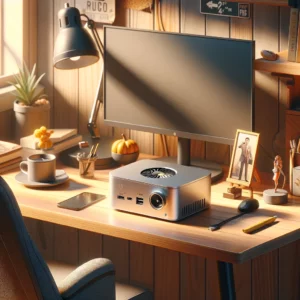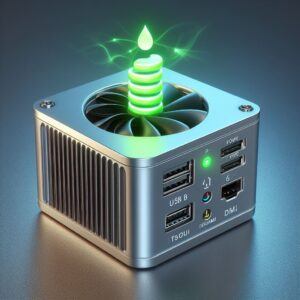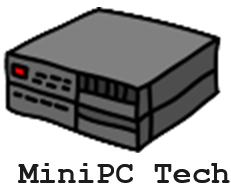You’re eyeing a mini PC as a cost-effective solution for your small business, and I’m here to clarify how that move could be one of your smartest investments this year. An Affordable Mini PC doesn’t have to mean underpowered, and I’ll show you why.
The value equation of mini PCs centers on finding the sweet spot between price and capability. You need a machine that won’t buckle under the daily demands of your business operations. So, I’ll unpack real-life examples where the best mini PCs have powered through tasks without the premium price of larger rigs.
What does affordability mean?
But it’s not just about what’s under the hood. Costs also encompass longevity and reliability. I believe in looking at the full picture. How often will upgrades be necessary, and what are the associated costs? By opting for a budget mini PC, you can cut down on those future expenses.
Yet, there’s more to the story than cost alone. The practicality of an affordable mini PC’s form factor adds intrinsic value, especially where space is at a premium. Let me assure you, that these compact machines can deliver serious results without occupying prime real estate on your desk.
Speaking of desks, let’s consider where these sleek little performers fit best. Beyond just tagging them as ‘cost-effective,’ think about how their versatility meets the dynamic needs of today’s businesses. That, my friends, is what we’ll explore in our next section.
Multifaceted Marvels: The Versatile Roles of Affordable Mini PCs in Business
Affordable mini PCs aren’t confined to a single role within a small business setting. In fact, these compact powerhouses carry the ability to transform a myriad of environments into efficient workspaces. Envision a compact office where space is a premium; mini PCs can fit into such tight quarters with ease. They can replace large desktops and pave the way for an uncluttered and productive area.
What about home offices or living rooms that double as operational bases, especially in the era of remote work? Here, the small footprint of mini PCs makes them ideal candidates to integrate seamlessly into any setting. They serve as discreet yet robust home entertainment systems, light gaming, or workstations, without dominating the space.

The versatility of mini PCs extends to their application in various job functions, opening doors for customized setups tailored to specific industry needs. Take for example the retail sector, where mini PCs power point-of-sale systems, digital signage, and inventory management – all while occupying minimal real estate at the sales counter.
You also need to determine what type of processing these machines will be doing. If it’s for a non-technical person doing typical office work as their every day tasks, it may be mostly web browsing and document generation. For that kind of office use, a more budget-friendly mini pc will do.
On the other hand, if there is a need for graphics or a high amount of processing, a more powerful mini PC might be called for.
Of course, you may wonder how these diverse applications translate into figuring out which mini PC is right for your unique business needs. The next section will guide you through the essential specifications to consider, simplifying the decision-making process with clear, actionable advice.
Fine-Tuning Your Mini PC Choice: Specs That Matter
Understanding the specifications of a mini PC is nothing short of essential when you’re aiming to get the most out of your investment. Some may find technical specs intimidating, but I’ll break them down, making it straightforward to choose the right device based on your needs.
The CPU: The Engine that Does
The central processing unit (CPU), for one, is the mini PC’s brain. Depending on the tasks you’ll throw at it, you’ll want a CPU that can handle everything efficiently. For standard office tasks, a mid-range CPU should suffice. However, if you’re looking into more demanding applications like video editing or data analysis, aim for a higher-end processor.
Memory: Where the Magic Happens
In terms of memory or RAM, more is typically better. A mini PC with at least 8GB of RAM is recommended, but if you frequently multitask or run complex software, 16GB might be the starting point. DDR4 memory technology is probably a minimum to get good performance and energy efficiency.
Storage: Where Programs Stay Between Calls
As for storage options, solid-state drives (SSDs) offer quick boot times and reliability. Starting at 256GB is wise, though consider higher capacities if you handle large files.
Some models also offer expandability through additional SSD or RAM slots, which is a bonus if you anticipate growing demands.
Connectivity: How Computers Work With Things
Connectivity is another critical spec. A good mini PC should have a combination of USB 3.0 ports. USB 3.2 ports, HDMI ports, or DisplayPort outputs, and robust Wi-Fi and Bluetooth connections. You need to figure out how many displays you need and how many of them will be 4k displays. Also, whether you need a faster and more reliable Wi-Fi 6 or whether the standard Wi-Fi 5 will work for you
The more USB ports you have, the more peripherals you can comfortably support. Some mini PCs have a mix of Type A (the more standard) and Type-C (the smaller) USB ports.
Operating Systems: How Software Talks To Hardware
Operating System can be an important consideration if the Mini PC is going to be a “good citizen” in the environment it will operate in.
A sea of iPhones and MacBooks? Spending $150 for a good Beelink Intel Mini PC with a lower-end Intel Celeron processor running Windows 11 may not make any sense. The Apple Mac Mini is the perfect mini PC for this environment. Even though it is a bit pricey compared to Windows or Linux-based mini-PCs, there are still affordable options here given the cost of ownership.
A Microsoft shop? Windows 11 Pro works. Windows 10 should rarely be used in my opinion unless there is a compelling need. As of the time of this post, Windows 10 is end-of-life in 2025.
Technophile? One of the many Linux variants will work here.
How Are You Going to Use the Mini PC?
Another consideration is how you are planning to use this device. Do you need a gaming mini pc? Then you need a mini pc designed for high speed with a Ryzen 7 processor or equivalent may be in order. This along with high-resolution graphics from at least the equivalent of an AMD Radeon 680m GPU or better.
Is this mini pc for home and business use? Then a budget option may be your most affordable solution if all you need is tasks like web browsing and document generation.
Warranty and Support: After the purchase
Lastly, but often disregarded, is the importance of warranty and support. A solid warranty can alleviate concerns with potential hardware issues, and having accessible customer support can save countless hours and ensure that your business does not experience unnecessary downtime due to a tech hiccup.
Eco-Friendly Computing: Harnessing the Energy Efficiency of the Affordable Mini PC

For mini PCs, the energy efficiency benefits are a game changer. Let me explain why mini PCs could be the eco-conscious choice for your business as well.
Firstly, mini PCs consume significantly less power compared to their full-sized counterparts. This isn’t just about being kind to the environment; it translates to LOWER ELECTRICITY BILLS. For businesses where computers are running all day, those savings can be substantial over the long term.
I dug into some statistics and found that mini PCs can save a business up to 50% on their energy costs compared to traditional desktops. That’s not pocket change, especially when you’re operating with a tight budget. It’s an economic decision with positive environmental implications.
And it’s not just the power saving; mini PCs require fewer raw materials to produce. This reduced manufacturing footprint means less waste and less environmental impact. When you choose a mini PC, you contribute to a more sustainable tech ecosystem.
The mini PCs on my desks not only cut down on power consumption but also keep noise levels low and reduce the heat output, which in turn could decrease the need for additional cooling in your office space. That’s yet another way to manage costs effectively while maintaining a comfortable work environment.
Remember, eco-friendly practices are not just about immediate benefits. They represent your company’s commitment to social responsibility. This commitment can strengthen your brand image and even attract like-minded clients and talent who prioritize sustainability.
So, as we move to the next section, consider how ensuring the security of your devices isn’t just about protecting data — it’s about protecting your business’s reputation and ensuring long-term viability in an increasingly environmentally conscious market.
Safeguarding Your Digital Footprint: Security Features of Mini PCs

Security isn’t an aspect of technology that you can afford to overlook, especially when your business hinges on the integrity of your data. Affordable mini PCs come equipped with numerous security features tailored to protect your business without stretching your budget.
Most mini PCs on the market today include built-in security features such as firmware TPM (Trusted Platform Module), hardware-based encryption, and the option to integrate enterprise-grade security solutions. These aspects are crucial for small businesses as they reduce the vulnerability to cyber threats.
Aside from the intrinsic security features, your own security practices play a significant role. That means regular updates, secure Wi-Fi practices, the use of strong passwords, and the implementation of two-factor authentication wherever possible. It’s about creating layers of defense that safeguard every aspect of your business.
Empowering your team with the knowledge of endpoint security is equally important. After all, the human element often proves to be the weakest link in the chain. Conducting security training, establishing clear protocols, and fostering an environment of security mindfulness will heighten your defense against cyber risks.
Looking ahead, the continuous evolution of technology promises even more robust security features in mini PCs. As machine learning and AI integration become more commonplace, anticipate smarter security protocols that can predict and neutralize threats before they become issues.
When it comes to protecting your small business, a mini PC on a budget doesn’t mean you have compromised on security. These compact yet powerful devices offer comprehensive protection that meets the needs of today’s dynamic business environments, balancing cost with a commitment to safeguarding your operations.
Affordability: Find the best mini PC for your needs

As we’ve journeyed through the myriad benefits and considerations of choosing an affordable mini PC for your small business, it’s clear that these compact powerhouses are more than just a budget-friendly option. They’re a smart investment in your business’s future, blending performance, versatility, and eco-conscious computing into one sleek package. Now, it’s time to take the next step.
Embrace the Future with Affordable Mini PCs
Whether you’re optimizing your home office, streamlining operations in a compact business space, or looking to reduce your environmental footprint, affordable mini PCs offer a solution that meets your needs without compromising on quality or performance. With the insights and guidance provided, you’re well-equipped to make an informed decision that aligns with your business objectives and tech requirements.
Check out the options for Affordable Mini PCs
Don’t let the opportunity to enhance your business’s efficiency, security, and sustainability pass you by. Explore the world of affordable mini PCs and discover how these technological marvels can transform your operations, save costs, and propel your business into a future of endless possibilities. Start your journey towards smarter, more sustainable computing today and witness the impact a mini PC can have on your business’s success.
Your smart investment awaits. Explore your options, compare features, and choose the affordable mini PC that’s right for you. The best budget mini pc may not be the best mini pc you can buy. For everyday tasks like web browsing and video streaming, a low cost mini desktop pc may be the answer. On the other hand, this may not support even casual gaming, so you may need to spend a little more for a truly affordable and functional unit when looking for the best mini pc.
The future of business computing is compact, powerful, and incredibly efficient—embrace it now.
Frequently Asked Questions
What is an affordable mini PC?
An affordable mini PC is a compact, cost-effective computing device that offers the functionality of a desktop computer in a much smaller footprint, suitable for users with budget constraints or limited space.
How does an affordable mini PC compare to a traditional desktop?
While affordable mini PCs may not match the high-end performance of some traditional desktops, they are capable of handling everyday tasks such as web browsing, document editing, and media playback efficiently, with the added benefits of portability and lower power consumption.
Can I use an affordable mini PC for gaming?
Yes, some affordable mini PCs are equipped with decent integrated graphics or low-end dedicated GPUs, making them suitable for casual gaming and older titles. However, they might struggle with the latest, graphics-intensive games at high settings.
What should I look for when choosing an affordable mini PC?
Key factors to consider include the processor’s performance, RAM and storage capacity, available ports for peripherals, and whether the system supports upgrades or expansions to meet future needs.
Are affordable mini PCs good for students?
Absolutely, their compact size, sufficient computing power for educational software, and affordability make mini PCs an excellent choice for students who need a personal computer for study and entertainment.
How can I enhance the performance of an affordable mini PC?
Enhancing performance can often be achieved by adding more RAM (if the device supports it), using an SSD for faster data access speeds, and optimizing the operating system settings for better efficiency.

I am a retired software engineer with experience in a multitude of areas including managing AWS and VMWare development environments. I bought a relative a mini-PC a year ago and have become passionate about the technology and its potential to change how we deploy software.
